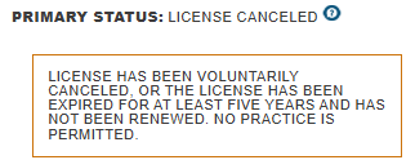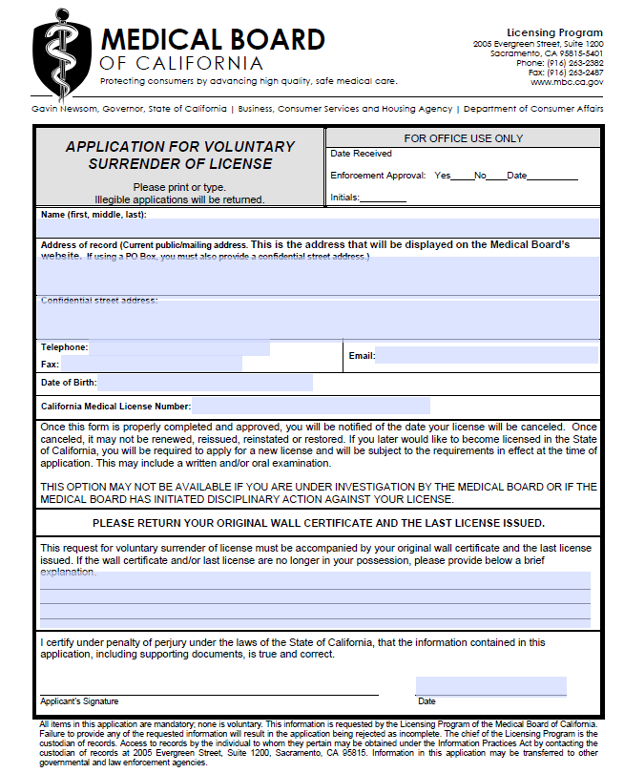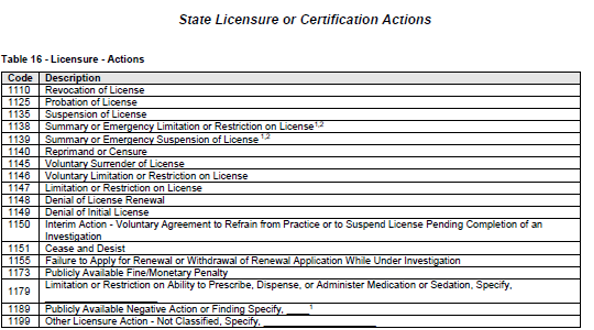My first job was in California. That was a long time ago. I practiced there for about 3 years. Then I moved. My California medical license terminated. I can’t remember if I sent a note to the Medical Board of California (MBC), or just did not renew my application.
It was a long time ago.
This is how I appear on the MBC’s website under my profile:

I suppose that’s accurate.
So, in California, you can avoid renewing for 5 years in a row, and your license is automatically cancelled. Or you can take an affirmative step. And cancel your license.
So, what’s the fuss?
Well, to cancel your license, you have to fill out a form labeled “Application for Voluntary Surrender of License.”
See below:
Instead of being labeled “Application to Voluntarily Cancel License”, it has the scary sounding “Application for Voluntary Surrender of License.”
Surrender is what happens at the end of a war. It happens when you turn yourself in if there’s an outstanding arrest warrant.
Importantly, many applications (other medical license applications, applications for hospital staff membership/clinical privileges, etc.) ask if you have ever “surrendered” your license. Such questions typically ask whether you surrendered your license while under investigation.
But if you look at codes in the National Practitioner Data Bank (NPDB), here’s a short list of those that can be submitted by a state licensing body.
“Voluntary Surrender of License” (1145) is not qualified.
Still, the NPDB implies a qualifier. On its website, the NPDB clarifies explicitly:
Voluntary Surrenders
The voluntary relinquishment of a license for personal reasons such as retirement or illness is not reportable to the NPDB if no other action or investigation is in progress.
Federal licensing and certification agencies are required to report voluntary surrenders of a license, certification agreement, or contract for participation in a government health care program by a health care practitioner, provider, or supplier. NPDB regulations define a voluntary surrender of a license or certification as “a surrender made after a notification of investigation or a formal official request by a federal or state licensing or certification authority for a health care practitioner, health care entity, provider, or supplier to surrender the license or certification (including certification agreements or contracts for participation in federal or state health care programs). The definition also includes those instances where a health care practitioner, health care entity, provider, or supplier voluntarily surrenders a license or certification (including program participation agreements or contracts) in exchange for a decision by the licensing or certification authority to cease an investigation or similar proceeding, or in return for not conducting an investigation or proceeding, or in lieu of a disciplinary action.”
The voluntary relinquishment of a license for personal reasons such as retirement or illness is not reportable to the NPDB if no other action or investigation is in progress. Only the surrender of the license while under investigation, or in return for not conducting an investigation, is reportable.
By the way, just because your license is cancelled in California, it still maintains authority to discipline you.
California Code, Business and Professions Code – BPC § 10103
The lapsing or suspension of a license by operation of law or by order or decision of the department or a court of law, or the voluntary surrender of a license by a licensee shall not deprive the department of jurisdiction to proceed with any investigation of or action or disciplinary proceeding against such licensee, or to render a decision suspending or revoking such license.
This window does not stay open forever. This is how the Medical Board describes it:
Pursuant to Business and Professions Code section 2230.5, Board must file an Accusation (formal charges against a physician’s license) within three (3) years of the date the Board is first notified of the act or omission alleged as the ground for disciplinary action or seven (7) years from the date of the incident, whichever occurs first. If a complaint is filed just before the seven-year time limit, the Board may not pursue the case because there won’t be enough time to obtain all the documents and have them reviewed before the seven-year statute of limitations expires. There are several exceptions to the statute of limitations including complaints involving sexual misconduct and care and treatment provided to a minor.
And here is how the California Code describes it (allegations of sexual misconduct can be prosecuted a decade after occurring…and allegations of incompetence, gross negligence, or repeated negligent acts can be prosecuted even later “upon proof that the licensee intentionally concealed from discovery his or her incompetence, gross negligence, or repeated negligent acts.”):
California Code, Business and Professions Code – BPC § 2230.5
(a) Except as provided in subdivisions (b), (c), and (e), any accusation filed against a licensee pursuant to Section 11503 of the Government Code shall be filed within three years after the board, or a division thereof, discovers the act or omission alleged as the ground for disciplinary action, or within seven years after the act or omission alleged as the ground for disciplinary action occurs, whichever occurs first.
(b) An accusation filed against a licensee pursuant to Section 11503 of the Government Code alleging the procurement of a license by fraud or misrepresentation is not subject to the limitation provided for by subdivision (a).
(c) An accusation filed against a licensee pursuant to Section 11503 of the Government Code alleging unprofessional conduct based on incompetence, gross negligence, or repeated negligent acts of the licensee is not subject to the limitation provided for by subdivision (a) upon proof that the licensee intentionally concealed from discovery his or her incompetence, gross negligence, or repeated negligent acts.
(d) If an alleged act or omission involves a minor, the seven-year limitations period provided for by subdivision (a) and the 10-year limitations period provided for by subdivision (e) shall be tolled until the minor reaches the age of majority.
(e) An accusation filed against a licensee pursuant to Section 11503 of the Government Code alleging sexual misconduct shall be filed within three years after the board, or a division thereof, discovers the act or omission alleged as the ground for disciplinary action, or within 10 years after the act or omission alleged as the ground for disciplinary action occurs, whichever occurs first. This subdivision shall apply to a complaint alleging sexual misconduct received by the board on and after January 1, 2002.
(f) The limitations period provided by subdivision (a) shall be tolled during any period if material evidence necessary for prosecuting or determining whether a disciplinary action would be appropriate is unavailable to the board due to an ongoing criminal investigation.
Sometimes, leaving is not easy.
What do you think?








Just how is a licensed physician supposed to know this? Or any other issue that has medical legal implications? Does a physician have to consult a qualified healthcare attorney before making any decisions in his/her professional life?
Sadly, the answer is yes. No kidding. The feds, the states, the boards, the hospitals, the NPDB, all have rules that must be understood before they can be followed. And, often these rules are hard to find. Keep your lawyer’s number on speed dial.
Richard B Willner
The Center for Peer Review Justice
What are the rules for attorneys??
Why are the rules for attorneys so much more relaxed than for physicians?
Where is equal protection under law?
The answer to your question pointing out that physicians are micro-managed compared to other professions, especially law is that Democrats have been in control too long.
This is the reason. Democrats understand that most private practice physicians rarely vote for Democrats.
Of course there are fewer private practice doctors now. But old habits remain. Democrats have been at war against physicians for years.
How you vote has consequences.
Michael M. Rosenblatt, DPM
I could not disagree more vehemently, Michael. Please respect and don’t misuse this useful nonpartisan legal forum for partisan political objectives.
The reason that physicians and other clinicians such as you experience inordinate regulatory scrutiny is that we falsely believe that we deserve (because of the nobility of our profession and all of our sacrifices to enter it) to be protected from such oppression, and then we remain passive in the face of onerous and sometimes malevolent regulatory mission creep.
Lawyers, OTOH, know the law, know its caprices, and take steps both individually (by suing) and collectively (through lobbying and legislation) to keep themselves safe from regulators who are trying to justify their existent through ridiculous laws like the ones Jeff cited.
Dr. Andrew, thank you for your argument. It is logical for editors of a professional service blog to try to avoid alienating their readers with politics. The other participants are not so constrained.
Despite your initial skepticism, we probably agree on most of this. I can quote the various Stark laws that have damaged physicians by creating felonies of ordinary business practices.
I can also refer to the NPDB regulations that started with a laudable effort to reduce risks from incompetent doctors. They quickly morphed into the ability for corporations and hospitals to fire and destroy fully competent doctors and ruin them. Without cause.
Democrats also coddle the plaintiff’s bar for strictly political reasons.
On balance, it does appear that Democrats are at war against physicians. I would however agree with you that the doctors have not fought back.
Michael M. Rosenblatt, DPM
Dr. Andrew, Thank you for pointing out that this blog is supposed to be nonpartisan. You said that much more eloquently than I was going to. Having said that, however, I do wish to point out how the current administration appointed a total incompetent to run the healthcare of our country. As I have as much training and environmental law as he has in any area of healthcare, I am now considering becoming an environmental attorney upon my retirement from dentistry.
Dr. Schlissel, it is reasonable to argue that a non-physician/non medical scientist is not necessarily the best choice to operate health and human services.
That said, during the COVID lockdown, those other allegedly qualified scientists politicized their decisions far beyond any reasonable understanding of the “science.”
Everyone knew that the entrance of Covid 19 came directly out of US bacterial/viral war research. Yet nobody admitted it from either political party, or Media.
I’m not entirely convinced that the present HHS leader is any worse. Perhaps he is no better. The jury is still out on that.
Michael M.Rosenblatt, DPM
“Everyone knew that the entrance of Covid 19 came directly out of US bacterial/viral war research.”
Yeah, everyone knew based on a lot of speculation amongst conspiracy-minded folk. Where is your proof? Which legitimate investigative entity has concluded such?. However, I can say that everyone knows that Covid escaped from a Chinese bio-warfare lab. See how that works?
“I’m not entirely convinced that the present HHS leader is any worse”
Then you will never be convinced. When there are outbreaks of preventable childhood diseases with life-impacting consequences (e.g., polio, measles) resulting from guidance from a vaccine-sceptic HHS, then maybe you’ll start to be convinced, but the damage will already have been done.
“Everyone knew that the entrance of Covid 19 came directly out of US bacterial/viral war research.”
Yeah, everyone knew based on a lot of speculation amongst conspiracy-minded folk. Where is your proof? Which legitimate investigative entity has concluded such? This is not science; you cannot disprove a negative. However, I can say that everyone knows that Covid-19 escaped from a Chinese bio-warfare lab. See how that works?
“I’m not entirely convinced that the present HHS leader is any worse”
Then you will never be convinced. People look to HHS and CDC for guidance on matters related to health and safety. It has generally relied on scientific knowledge and free of ideological interference, until now. When there are outbreaks of preventable childhood diseases with life-impacting consequences (e.g., polio, measles) resulting from guidance from a vaccine-sceptic HHS, then maybe you’ll start to be convinced, but the damage will already have been done. It is sociopathy
It appears from the article that navigating the complexities of a medical board’s authority can be challenging, particularly following the expiration of your license. However, I would seem that allowing your license to lapse may present a reduced risk of future complications in comparison to the option of voluntarily surrendering it, especially in a state where you do not intend to continue practicing.
However can State Medical Boards take reciprocal disciplinary actions to a 10 year old lapsed licensed ?